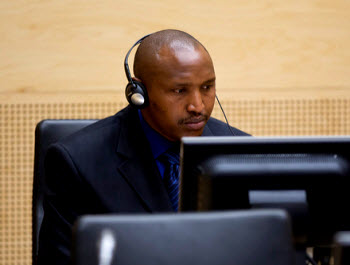After years of fleeing justice, Ntaganda finally appeared before the ICC to start a lengthy process to decide whether to press war crime charges against him.
Ntaganda spoke in Kinyarwanda, one of the official languages of Rwanda - the Democratic Republic of Congo's tiny neighbor that is often accused of meddling in Congolese affairs. He said he was born in Rwanda, but identified himself as a Congolese soldier. He said he understood his rights and the crimes he is accused of, which include murder, rape, pillaging and using child soldiers.
Ntaganda said he is not guilty, before being cut off by the presiding judge who said this was not the time to enter a plea.
Ntaganda's subdued and soft-spoken manner does not fit with his reputation. Nicknamed "The Terminator," he allegedly committed atrocities during 15 years as a rebel fighter in mineral-rich eastern Congo. Most recently, he was considered a key leader of the M23 rebel group, which launched a major offensive against the Congolese government last year, briefly capturing the North Kivu capital of Goma.
At the ICC, he faces accusations of war crimes and crimes against humanity committed in the northeastern Ituri region in 2002 and 2003. He is also accused of recruiting underage soldiers last year for the M23 rebellion.
But it will be months before the court decides whether to pursue the charges against him. The judge set a provisory date of September 23 to make that decision. The prosecution and defense are also meeting in mid-April to discuss documents and witnesses each side is pursuing.
Ntgada's appearance Tuesday aids the stature of the criminal court, after the collapse of several cases it was pursuing. Earlier this month, the ICC dropped crimes-against-humanity charges against a prominent Kenyan politician, citing problematic witnesses and government stonewalling.
Related articles
- • DRC and Rwanda Sign Declaration of Principles for Peace in Eastern Congo (April 25, 2025)
- • European Union Sanctions Rwanda and M23 Officials over Congo Conflict (March 17, 2025)
- • Canada and Germany Impose Sanctions on Rwanda for Supporting M23 Rebels (March 4, 2025)
- • UK Suspends Financial Aid to Rwanda Over M23 Rebellion (February 25, 2025)
- • European Union Suspends Defence Consultations with Rwanda (February 24, 2025)
- • Tshisekedi Announces Government of National Unity and Calls for Unity Against M23 Rebels (February 23, 2025)
- • UN Security Council Calls on Rwanda to Stop Supporting M23 Rebels in DR Congo (February 22, 2025)
- • US Sanctions Rwanda's Minister James Kabarebe for Central Role in DR Congo Conflict (February 20, 2025)
- • Rwanda-Backed M23 Rebels Summarily Executed Children in Bukavu, UN Reports (February 19, 2025)
- • DR Congo Citizens Head to Polls to Elect President, Members of Parliament (December 20, 2023)
- • 'Deadly environment' plus 'political and social' obstacles hinder Ebola fight, Security Council hears (July 24, 2019)
- • Ebola outbreak declared an international Public Health Emergency (July 17, 2019)
- • Constitutional Court Declares Tshisekedi Winner of Presidential Election (January 19, 2019)
- • Jean-Pierre Bemba named MLC presidential candidate (July 13, 2018)
- • At least 30 dead after massacres in Ituri (March 2, 2018)
- • Peacekeepers, Congo Army to Resume Joint Fight Against Rwandan Rebels (January 28, 2016)
- • Political tensions 'running high' in DR Congo ahead of 2016 elections (October 7, 2015)
- • DRC Army Putting Pressure on FDLR (April 1, 2015)
- • ICC Confirms 14-Year Sentence Against Thomas Lubanga (December 1, 2014)
- • ICC Case Against Bemba Wrapping Up as Another Opens (November 12, 2014)
- • Denis Mukwege Wins Sakharov Prize 2014 (October 21, 2014)
- • Violence in North Kivu Kills 21, Mostly Women, Children (October 18, 2014)
- • ICC confirms war crimes charges against Bosco Ntaganda (June 10, 2014)
- • ICC sentences Germain Katanga to 12 years (May 23, 2014)
- • Kerry Calls on Kabila to Honor Constitution (May 4, 2014)
- • Death toll in Lake Albert boat accident rises to 251 (March 27, 2014)
- • ICC finds Germain Katanga guilty of war crimes and crime against humanity (March 7, 2014)
- • Bosco Ntaganda Attacked Civilians on Ethnic Grounds, ICC Prosecutor Says (February 10, 2014)
- • New DR Congo amnesty law welcomed by UN envoys (February 5, 2014)
- • Colonel Mamadou Ndala Is Killed in Ambush (January 2, 2014)








